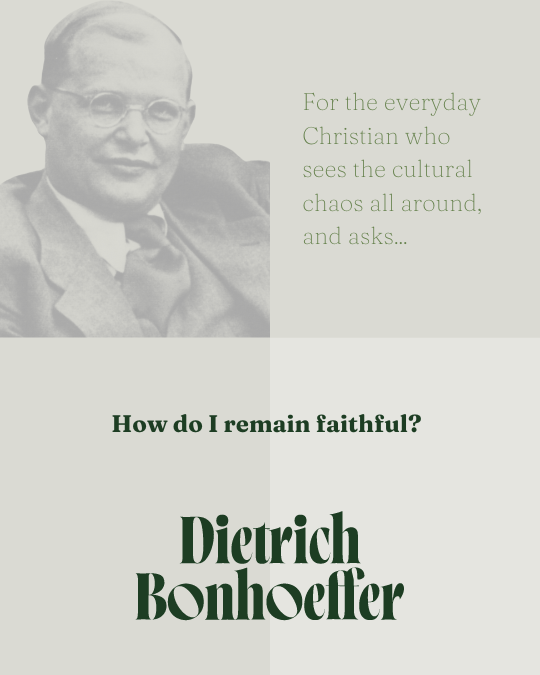
Written by Bonhoeffer Scholar and BibleMesh Institute Research Fellow: Dr. Brant Himes.
Angel Studios recently released the new film Bonhoeffer: Pastor. Spy. Assassin. As a Bonhoeffer scholar, I have been tracking with great interest the development of the film. The scholar in me is always cautious to see just what kind of “Bonhoeffer” will emerge from a new project, whether it be a new Bonhoeffer book, biography, documentary, or film. The history of Bonhoeffer interpretation from the 1960s until the present day has often been tempted by ideology. Bonhoeffer was such a compelling, nuanced, and historically complex and contextual individual that interpreters have been able to find ways to make Bonhoeffer into a supporter of their own agendas—whether or not those agendas are faithful to Bonhoeffer himself. Stephen Haynes has a wonderful book, The Bonhoeffer Phenomenon, exploring the many ways various schools of thought and interest groups have sought to make Bonhoeffer their own.
So, when I was contacted in January of this year about consulting with the lead producers of the new film to create an online Bonhoeffer course for BibleMesh, I wondered what kind of Bonhoeffer I would find. Was this going to be a right-wing Bonhoeffer? Or perhaps a liberal-activist Bonhoeffer? Or would the film actually do the hard work of mining the historical and theological complexity of Bonhoeffer to portray something more real? To my relief, from our first conversations it quickly became clear that the filmmakers were interested in the same question that drew me to Bonhoeffer years ago: “who is Jesus Christ for us today?”
My work with Bonhoeffer through graduate school and now professionally as an assistant professor for Los Angeles Pacific University has been focused on the question of discipleship. I’ve been driven and challenged by Bonhoeffer to discover what it means to follow-after Jesus in every area of my life. My goal is to be faithful to Bonhoeffer’s historical context and to his theology while bringing his ideas into cross-disciplinary conversations about public theology, culture, and discipleship. This is the heart of my two books currently contributing to Bonhoeffer scholarship: For a Better Worldliness: Abraham Kuyper, Dietrich Bonhoeffer, and Discipleship for the Common Good and Dietrich Bonhoeffer and Neo-Calvinism in Dialogue: Perspectives in Public Theology, edited with George Harinck.
So, what do I think of the new movie?
I first saw a screener of the Bonhoeffer film in March, when it wasn’t quite locked down in its final version. I’m honestly not much of a film aficionado, but I was determined to try to watch the film as both a scholar and a general audience member. Scholars are great at nitpicking—after all, that’s what we’re trained to do. At one point during my second viewing, I pulled out my copy of Eberhard Bethge’s Dietrich Bonhoeffer: A Biography to double-check some of the timeline and plot development in the film. I kept thinking, “did that happen then? Wasn’t that later? Did this meeting happen that way?” I quickly realized that those questions missed the whole point of not only this film but of filmmaking in general.
Filmmakers are storytellers. They have the incredible challenge of distilling historical complexity and nuance into a few trackable plot lines. This film is not a documentary; it’s not aiming to walk us step-by-step through Bonhoeffer’s life. It’s a biopic, a dramatization of a historical figure. For this project, the filmmakers dramatize Bonhoeffer’s story with the genre of a spy-thriller.
This was certainly a stylistic and artistic choice, but I think it works very well in how it tells a compelling story of a complex life. The film captures key moments and themes from Bonhoeffer’s life and presents his nuance and complexity in an accessible way to a popular audience. Now, I’m not sure how many Bonhoeffer scholars will be able to step out and commend the film. There’s a lot at stake to steward and protect Bonhoeffer’s legacy, and so the Bonhoeffer guild is understandably cautious about the intent and message of the film. Certainly scholars will find things to critique. They wouldn’t be scholars otherwise, and we need their deep insight and knowledge in order to really understand the implications of Bonhoeffer’s life and thought.

New Course
Bonhoeffer and the Life of Discipleship.
Dive into Bonhoeffer’s life and writings with our expert-led 8-unit course, and grow in your own life of discipleship.
Here’s what I don’t see in the film
I don’t see any justification whatsoever for Christians to take up arms or exhort to violence in support of an ideology. This is actually the biggest worry of Bonhoeffer scholars, the film’s actors, and even the family of Bonhoeffer about the film. They do not want to see Bonhoeffer co-opted into a mascot for far-right Christian nationalism. And rightly so.
I can’t imagine watching this film and getting motivated to partake in political violence. In fact, I see the opposite. In the film, Bonhoeffer is concerned with the reality of the lordship of Jesus Christ. This is the great struggle of the Confessing Church—that Jesus, not Hitler, is lord. The integrity of this conviction is what leads him down the dangerous path of opposition to the Nazis. Bonhoeffer was horrified by violence, and he knew it was antithetical to the way of Jesus. He knew his participation in the conspiracy was an act of guilt. And he knew that taking on that guilt was an act of solidarity with Jesus, on behalf of the victims of violence.
The risk of telling Bonhoeffer’s story has always been the possibility of misappropriation
That phenomenon is nothing new. Our historical and political environment puts us in a precarious place, and so the responsibility to tell his story in a way that points people to the peace of Jesus remains of vital importance.
I, for one, am looking forward to the countless conversations that this movie will raise about what it means to wrestle with the question, “who is Jesus Christ for us today?” This film is worth watching because it gets us talking about the way of Jesus.
A moment of hope
I also hope this film will spark a movement for people from all backgrounds to learn more about how Jesus is calling them to a life discipleship. Along these lines, I wrote a devotional, When Christ Calls: A 30 Day Journey with Dietrich Bonhoeffer, for movie-watchers to continue reflecting on how the legacy of Bonhoeffer points them to the reality of Jesus’ calling on their own lives. The call to discipleship is not easy, but it’s where we finally find true life. The book will be available at Angel Studios.
